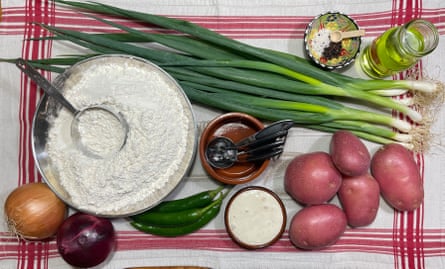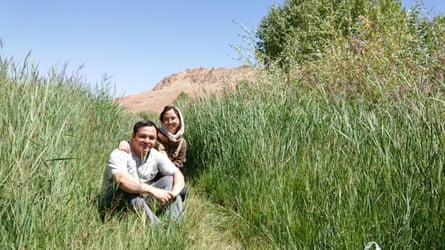
Bolani is an Afghan flatbread stuffed with potato, spring onions and green chillies and shallow-fried. It is very easy to make and is one of the most popular dishes of Afghan people. It can also be filled with pumpkin or sweet potatoes, red lentils, spinach, leeks or just chives. This simple and delicious food is usually served with green chutney and garlic-mint yoghurt and eaten as an appetiser, side dish or snack with a cup of tea.
I spent my childhood in a village in the green nature of Ghazni province in Afghanistan, where all the Taheri family, including my uncle, aunt, grandmother and grandfather, lived together. Life in the villages was hard, but all of us Taheri family are very close to one another. I will never forget the times when my mother and my aunts all worked together to cook bolani and other traditional food.
Making bolani, they would bring the vegetables and other ingredients fresh from nature. Bolani was sometimes baked in the oven and sometimes cooked in the pan. When I was six or seven years old, I remember being allowed to play with a piece of dough to make one piece of bolani. When I was a teenager, I became responsible for preparing the vegetables. Now I am responsible for the frying.

In recent years, Afghanistan had been getting better because both men and women were present in the community together. Women had the right to vote, work and study. They knew their natural rights and they worked hard to get them.
I was among those girls who were able to follow up their school continuously without any stop or break, but most of the girls could not go to school for several years due to the war.
In 2013, I entered the University of Economics; after graduating, I worked as a financial officer in a private school, and as executive manager at the Ministry of Finance. But with the arrival of the Taliban, women are no longer allowed to work in the office; the girls’ schools are closed. The Taliban have returned Afghanistan to what it was 20 years ago.
I am now in Australia with my family away from the war and bloodshed. Everything here is a new experience for me; last year was our first Ramadan in Australia.

During Ramadan, for iftar, there is always bolani, sambosas and ashak, a type of Afghan dumpling made from pasta dough and gadanz (similar to garlic chives). Sometimes there are different soups served alongside the main dish on the iftar table; and there is sher birinj (an Afghan rice pudding) to follow.
My father always said Ramadan is the month of kindness and the month of mercy. It was hard for me to understand these sentences when I was really young, but now that I have grown up and am fasting, I experience that beautiful feeling. Ramadan is a month of patience and the month to train yourself to do the best you can for others; because we should all be kind to one another, respect one another, not hurt anyone and help all people who are in need.
Farukh’s bolani recipe
Serves 10-12
Prep 1 hr
1kg plain flour
1 tbsp sourdough starter
1 tsp salt
Extra flour, for sprinkling
Oil, for frying
Buttermilk, chutney or garlic-mint yoghurt, to serve
after newsletter promotion
For the filling
4-5 medium-sized potatoes, whole and unpeeled
2 tbsp oil
3 long green chillies, finely chopped
1 brown or red onion, finely chopped
100g – 1kg spring onions, finely chopped (the amount varies depending on how “onion-y” you like your bolani)
1 tsp salt
1 tsp ground black pepper
To make the dough
Combine the flour, sourdough starter and salt in a bowl. Add about one-and-a-half cups of water, and stir well to make a homogeneous mixture. As the dough starts to form, add a little more water as necessary, but the dough shouldn’t be too sticky. On a floured surface, knead until smooth. Place dough in a bowl, cover bowl with clingfilm, and set aside to rest for 20 minutes.
To prepare the filling
In a large saucepan of boiling water, boil the potatoes. When they are cooked through, drain and leave to cool. When cool enough to handle, peel, and coarsely grate.
Heat oil in a nonstick frying pan. Add the green chillies and onion and saute for about two minutes, until slightly softened and lightly browned.
Remove the pan from the heat. Add the grated potatoes, spring onions, salt and pepper, and combine well.
To make the bolani
Divide the dough into 10 equal portions, and form into balls. On a lightly floured surface, take one dough ball. Using a rolling pin, roll into a circle approximately 20cm wide and 0.5 to 1cm thick. (The size can vary, depending on the size of the pan and the person making the bolani.)
Scatter a tablespoon of the filling on to half of the dough, leaving a 1cm border. (Don’t overfill – these are flatbreads, not Cornish pasties.) Fold over the dough to enclose the filling. Using your fingers or a fork, press the edges of the dough to seal. Set aside and cover with a clean tea towel. Repeat with the remaining dough and filling.
In a clean, nonstick frying pan, heat a few drops of oil and fry the bolani on one side until golden; turn over and fry on the other side. (You can press the bolani with a small wooden spoon while frying to ensure they brown evenly.) Repeat with the remaining bolani. Serve immediately with buttermilk, chutney or garlic-and-mint yoghurt.
-
Farukh Tahery was born in 1996 during the civil war in Afghanistan. Her family is from Ghazni province in south-eastern Afghanistan, one of the oldest provinces and a historic and commercial centre. In 2021, they were evacuated to Sydney, Australia when the US and western governments pulled out of Afghanistan and the Taliban resumed power
-
This is an edited piece from Recipes for Ramadan, where you can find more than 60 Australian-Muslim recipes and stories from 22 countries; and follow the project on Instagram, Facebook and YouTube



